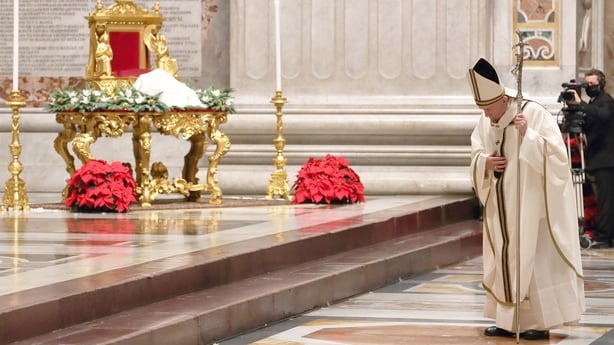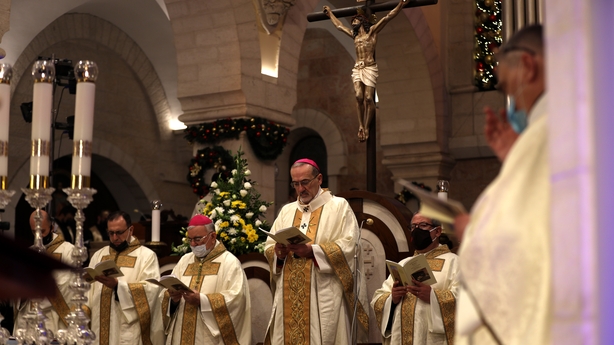Millions of people around the world are celebrating Christmas under coronavirus restrictions impacting a holiday typically marked by travel and large gatherings.
The battle to halt the pandemic is far from over despite the launching of mass vaccine campaigns that offer the promise of an eventual return to normalcy.
In a Christmas message, the head of the World Health Organization said the sacrifices made to protect people during the coronavirus pandemic must not be squandered over the festive period.
Millions were making "heart-wrenching sacrifices" by staying away from loved ones on Christmas Day, Tedros Adhanom Ghebreyesus said in a video clip posted to Twitter, while others will have a missing face at the family table.
He said vaccines, now beginning to be deployed in countries around the world, were starting to offer a way out of the crisis that has engulfed the planet this year.
"As 2020 draws to an end, a pandemic of historic proportions is preventing many of us from celebrating in the ways we would like," Dr Tedros said.
"Instead, hundreds of millions of people are today making great, heart-wrenching sacrifices by staying apart to stay safe.
"But in doing so, they are giving the most precious gifts: the gifts of life and health."
The novel coronavirus has killed at least 1.7 million people since the outbreak emerged in China last December, while almost 78.7 million cases have been registered, according to a tally from official sources compiled by AFP.
"All around the world, throughout this most trying of years, we have seen over and over again the sacrifices of so many people to protect and preserve life," said Dr Tedros.
I wish everyone a safe and restful holiday season. This year by staying apart to stay safe from #COVID19, we can all give the most important gifts of all: the gifts of life and health. #InThisTogetherpic.twitter.com/HlNobGujwg
— Tedros Adhanom Ghebreyesus (@DrTedros) December 24, 2020
"We must not squander their sacrifices, nor those made by so many families who, this holiday season, will sit at family tables missing a familiar face.
"Despite so much loss, we have built so much hope. Vaccines are offering the world a way out of this tragedy. But it will take time for the whole world to be vaccinated."
According to the WHO's overview of different candidate vaccines, 61 have entered human trials, 16 of which have reached final-stage mass testing.
A further 172 candidate vaccines are being developed in laboratories with a view to eventual human testing.
Dr Tedros said: "We must continue taking comfort in the fact that by caring for others, through acts of solidarity and safety, we can share the greatest gift of all: the gift of life."
In Rome, Pope Francis celebrated Christmas Eve mass in St Peter's Basilica before fewer than 200 people.
The mass, traditionally held at midnight, had been moved forward to meet Italy's curfew rules.
Before the pandemic hit, several thousand people would have attended the papal mass.
St Peter's Square, usually thronged with people on Christmas Eve, was deserted, illuminated by the glow of its towering Christmas tree and the lights of a police car.
Tough new coronavirus restrictions were imposed yesterday over the Christmas and New Year period across Italy, the country hardest hit by the virus in Europe, with nearly 71,000 deaths and more than two million cases since the beginning of the pandemic.
In his homily, Pope Francis stressed that the birth of a child reminds us not to spend our days "lamenting our lots, but soothing the tears of those who suffer", serving "the poor".

Bethlehem was preparing for a Christmas unlike any in its recent history.
Christmas Eve mass at the Church of the Nativity is traditionally the highlight of a holiday season that sees hundreds of thousands of visitors flock to the Palestinian city in the occupied West Bank.
The service was held online this year, with only clergy and select individuals allowed inside the basilica, which was sterilised ahead of the service.

"Everyone feels darkened, tired, exhausted, oppressed for too long under the heavy burden of this pandemic that besieges our lives," said the Latin Patriarch of Jerusalem, Pierbattista Pizzaballa.
For many, the isolation that has defined the past year will continue into Christmas Day and beyond - such as in Belgium, where residents are largely limited to welcoming a single visitor.
Ireland has been placed under Level 5 restrictions, with visits from up to two households allowed until tomorrow. From then only visits to private homes or gardens from one other household will be allowed until 31 December.
From 1 January no visitors are allowed in homes or gardens except for essential family reasons.
Britons, meanwhile, were cut off from swathes of the world due to the emergence of a new Covid-19 strain.
Some UK border restrictions have been temporarily relaxed for the holidays, but thousands from other European countries are still stranded in England.
"Home for Christmas? Forget it," said Laurent Beghin, a French truck driver who delivered his cargo but was still stuck days later.
Churches across South Korea stood largely empty, with worshippers congregating online as the country reported a new daily caseload record.
And in Catholic-majority Philippines, services were rocked when a 6.3-magnitude earthquake struck the country, capping off a troubled yuletide already muted by bans on parties and carol singing.
"Sad, very sad. Seeing everyone in masks, even the priest and altar servers, reminded me that the world as I know it is not the same," said Manila resident Kyen Quimpo Mallonga after watching Christmas Eve mass on television instead of attending her local church for fear of catching the virus.
Despite warm weather, the usual picnicking crowds also avoided the sands of Sydney's Bondi Beach, while the waves were empty of surfing Santas and patrolling police officers enforced social distancing rules.
Japanese Prime Minister Yoshihide Suga urged the nation to spend a quiet New Year period without the usual social gatherings to prevent the spread of Covid-19, which has been breaking infection records almost on a daily basis.
Japan also confirmed its first five cases of the new, faster-spreading variant of the virus in passengers arriving from the United Kingdom, Health Minister Norihisa Tamura said.
Japan has banned entry from UK, with the exception of returning Japanese nationals and those with residence permits.

